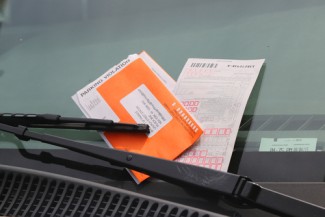Lawsuit says Michigan suspends safe drivers’ licenses because they can’t pay fines

Gustavo Frazao/Shutterstock
Equal Justice Under Law, a Washington, D.C.-based public interest group, has sued several American cities for using bail systems it says benefit the wealthy and punish the poor, irrespective of what danger they might pose to society.
According to The Crime Report at John Jay College in New York reports, the group alleges that the state of Michigan does something similar when it suspends the driver’s licenses of people who can’t afford traffic fines and fees.
In a lawsuit filed Thursday (PDF), Equal Justice Under Law alleges that this practice violates the equal protection and due process clauses of the 14th Amendment as well as the constitutional right to interstate travel.
“Although Michigan’s automatic suspension of driver’s licenses is designed to coerce payment, for people who are unable to pay, Michigan’s practice will never accomplish its intended goal,” the complaint says. “Michigan has trapped Plaintiffs in an inescapable cycle of poverty by suspending their licenses.”
The lead plaintiffs in the proposed class action are Adrian Fowler and Kitia Harris, both single mothers from Detroit whose driver’s licenses were suspended for unpaid traffic tickets and associated fees. Fowler owes more than $2,100, stemming in part from tickets she received while driving her infant daughter to a hospital to treat a high fever. Harris owes $276, which she can’t afford because she lives off disability payments due to a chronic medical condition. That condition makes it impossible to use the bus, the lawsuit says, so Harris must pay acquaintances to drive her to medical appointments.
Michigan’s secretary of state has suspended more than 100,000 driver’s licenses for nonpayment since 2010, the lawsuit says, without consideration of whether the driver is able to pay. The lawsuit alleges this violates the due process rights of poor Michiganders—15.8 percent of the state’s residents, according to the U.S. Census Bureau’s 2015 numbers—under several U.S. Supreme Court decisions forbidding punishing people who cannot afford fines or court costs. Because Detroit’s public transit system is “woefully inadequate,” the complaint says it also violates plaintiffs’ fundamental right to interstate travel.
And this violates the plaintiffs’ equal protection rights, the lawsuit says, in part because governments may not take advantage of their status as governments to use “unduly harsh methods of debt collection.”
“Losing a driver’s license is an extraordinary punishment that goes far beyond a fine,” Phil Telfeyan, executive director of Equal Justice Under Law, told The Crime Report. “It is an attack on a person’s independence, pride and character.”



